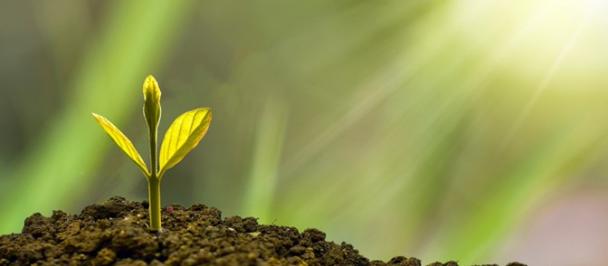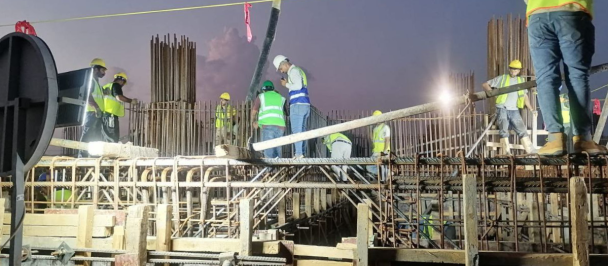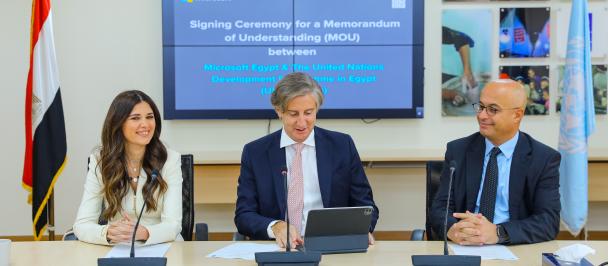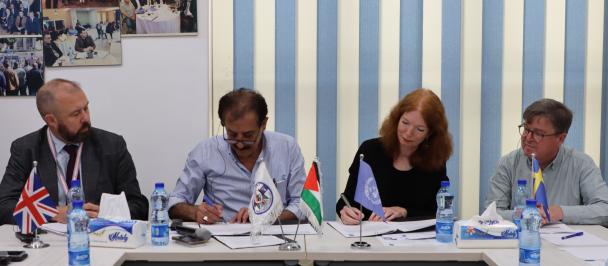United Nations and European Union improve the livelihoods and employment prospects for youth in Tripoli and Al-Beddawi
March 11, 2024
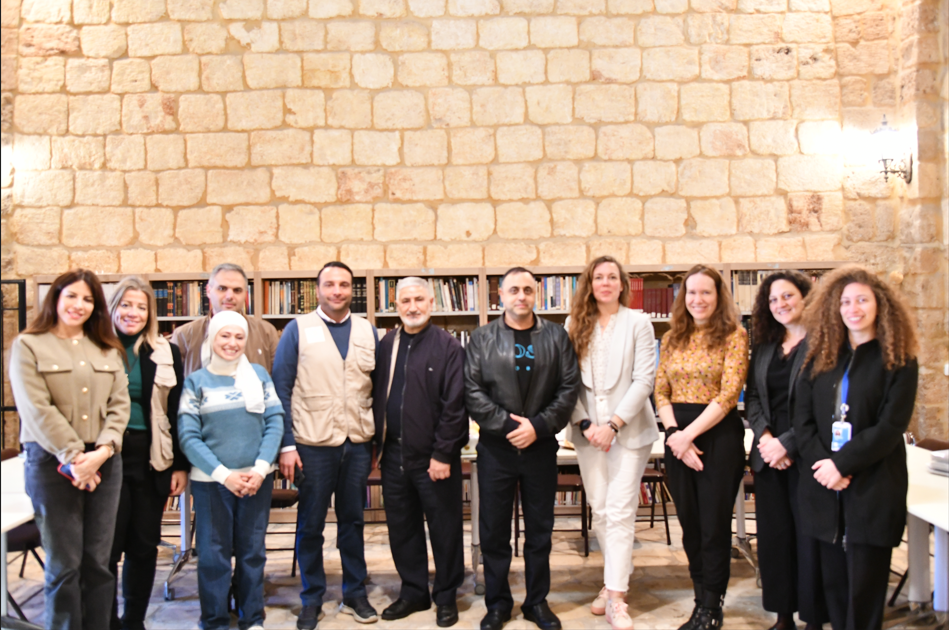
Beirut– Committed to supporting local authorities improve livelihoods and youth services in Lebanon, the United Nations Development Programme (UNDP) and the United Nations Human Settlements Programme (UN-Habitat) with the generous support of the European Union inaugurated the newly digitized public library system at Nawfal Palace, Tripoli and business incubator and agricultural training center at the rehabilitated Al-Beddawi Castle in Al-Beddawi municipality.
The protracted socioeconomic, financial, and political crises in Lebanon have severely impacted municipalities, including those of Tripoli and Al-Beddawi. This has affected the services municipalities can provide, as well as their efforts to preserve historical buildings such as Nawfal Palace and Al-Beddawi Castle.
Nawfal Palace
The rehabilitation of the Palace was made possible through the European Union's funding of US$ 145,000. This contribution not only facilitated the restoration work but also equipped the palace with CCTV cameras, a sound system, a high-definition projector, and other essential equipment that supported the library’s modernization. The work involved eliminating water leaks and restoring the historical ceilings, building facades, windows, and walls. This initial phase was completed in August 2023, and the Palace re-opened to the public in September of the same year.
The second phase of the restoration, recently finalized, includes the renovation of remaining parts of the Palace's ceiling and the establishment of a library archiving system to monitor the usage of the library's books. This will facilitate residents access to invaluable content at the palace library, home to over 10,000 volumes spanning diverse disciplines and including century-old documents. It will also contribute to revitalizing both the palace and its library, and in creating an inclusive cultural space for all.
Al-Beddawi Castle Business Incubator and Agricultural Initiative
The business incubator and agricultural initiative at Al-Beddawi castle were implemented by the UN in partnership with the municipality to complement its socioeconomic development plan through the European Union's funding of US$ 251,310. The main objective of this initiative is to improve the socioeconomic situation of young people in Al-Beddawi municipality, through the provision of vocational and business-related training opportunities. These trainings, which the municipality will implement in partnership with different local civil society organizations, come in response to the very high unemployment rate among young people in the area. The first trainings are expected to start in April 2024 and will benefit at least 80 young people in the first training round.
To accommodate the trainings, several improvements were made to the castle – a historically classified building – including upgrading its electrical network and lighting, as well as the installation of a solar power system to provide the castle with continuous and green electricity. Furthermore, the castle’s facilities were renovated, and its roof was weatherproofed to prevent water leaks.
The business incubator was equipped with electrical appliances and information technology equipment. Furthermore, a studio sound system will be delivered in the coming period to facilitate the delivery of trainings in partnership with QUAD related to entrepreneurship, market analysis, and marketing among others.
As part of the agricultural initiative, two municipal lands were upgraded to allow for agricultural related trainings. The lands were equipped with an electrical generator, irrigation system, water tanks, and solar panels. A water truck will also be provided in the ensuing months as well as all needed gardening tools, seeds, and plants, to support the agricultural training activities. Furthermore, additional funds will be allocated to support the implementation of agricultural training for youth and women in the area, expected to start in April 2024.
"UNDP is dedicated to enhancing livelihoods in Lebanon by supporting local authorities. By rehabilitating Nawfal Palace and digitizing its library, we offer the youth of Tripoli and the North access to invaluable resources and training opportunities. Similarly, the refurbished Al-Beddawi Castle and adjacent agricultural lands will facilitate vocational and business training for Al-Beddawi's youth, boosting their employability. We emphasize the importance of municipalities' ongoing maintenance and support for these projects to guarantee their sustainability," said UNDP Lebanon Acting Resident Representative Mohammed Salih.
“Preserving historical places in cities is key to maintaining their social fabric and identity for future generations. I am happy to see these spaces transformed so that they are multipurpose and can be used by the public as a place to come together, learn and exchange experiences. Not only are these spaces now accessible, but they can also provide a wealth of opportunities for people – especially youth – to gain knowledge and skills that can facilitate their access to wider livelihood opportunities and income-generating activities,” said Taina Christiansen, Head of UN-Habitat Lebanon.
The EU is proud to contribute to the further refurbishment of the Nawfal palace and its library that is not only an historical landmark but also a cultural space for all. Through the support provided to the Al Beddawi Castle Business Incubator and Agricultural Initiative, the EU reaffirms its engagement towards youth employment and sustainable green jobs.
END
For more information please contact:
Aline Kiwan, MERP Media and Communication Officer, at aline.kiwan@un.org, mobile 03-294070
Note to editors
About the Municipal Empowerment and Resilience Project (MERP)
MERP is a joint project by the United Nations Development Programme (UNDP) and the United Nations Human Settlements Programme (UN-Habitat). The Project is being implemented in partnership with the Ministry of Interior and Municipalities (MoIM) and funded by the European Union (EU). The project aims to strengthen the long-term resilience of subnational authorities in Lebanon as well as host communities and displaced persons affected by the Syrian crisis. Learn more about MERP at UNDP website and UN-Habitat website.
About the United Nations Human Settlements Programme (UN-Habitat)
UN-Habitat works in over 90 countries supporting people in cities and human settlements for a better urban future. Working with governments and local partners, its high impact projects combine world-class expertise and local knowledge to deliver timely and targeted solutions. The 2030 Agenda for Sustainable Development includes a dedicated Goal on cities, SDG 11 – to make cities inclusive, safe, resilient and sustainable.
Learn more at www.unhabitat.org/lebanon or follow us on Twitter at @UNHabitatLB, on Facebook at UN-Habitat Lebanon and on Instagram at UNHabitatLB
About the United Nations Development Programme (UNDP)
UNDP is the leading United Nations organization fighting to end the injustice of poverty, inequality and climate change. Working with our broad network of experts and partners in 170 countries, we help nations to build integrated, lasting solutions for people and the planet.
Learn more at www.lb.undp.org or follow on Twitter at @UNDP_Lebanon, on Facebook at UNDP Lebanon and on Instagram at UNDP_Lebanon
About the European Union (EU)
The European Union supports Lebanon’s stability, independence and sovereignty, its prosperity and democratic order. It strives also to help protect its environment and natural resources by supporting sustainable enterprise and development. The European Union is also committed to the promotion and protection of human rights in Lebanon including defending gender equality, children’s rights and freedom of expression. The EU Delegation in Lebanon represents the European Union to the Republic of Lebanon with the objective to maintain and develop mutual beneficial relations. It engages in political, social and economic development activities on behalf of the European Union and based on the most pressing needs of the country of Lebanon.
Learn more on the work of the EU in Lebanon or follow on Twitter, Facebook and Instagram at @EUinLebanon

 Locations
Locations